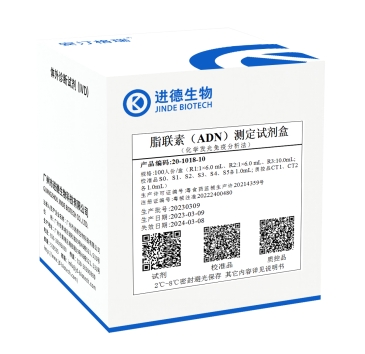ADN(脂联素)
Adiponectin Chemiluminescent Immunoassay

☑️ Description
Adiponectin is an abundant hormone released by adipocytes (fat cells), commonly referred to as an adipokine. Adiponectin plays a large metabolic role in the body, participating in the regulation of glucose levels, insulin sensitivity, and lipid catabolism. Adiponectin also helps support proper endothelial functioning and has multiple anti-inflammatory properties, including inhibition of the transformation of macrophages into foam cells, which is one of the first steps of atherosclerosis. Unlike other adipokines, adiponectin levels are lower in obese individuals. As adipocytes become larger with weight gain, they release less adiponectin. Among healthy individuals, women typically have higher adiponectin levels than men.
☑️ Clinical Significance
Individuals with low adiponectin levels have a 3X greater risk of developing metabolic syndrome.
Men with two or more risk factors for metabolic syndrome and high adiponectin levels are half as likely to develop metabolic syndrome as men with low adiponectin levels.
Individuals with low levels of adiponectin are up to 9X as likely to develop type 2 diabetes.
Individuals with low adiponectin levels have a 2X increase in the prevalence of CAD.
☑️ Testing Frequency
Adiponectin testing is determined by an individual’s medical history, but may be performed semi-annually or annually as necessary. If the initial test result is abnormal, then follow-up testing may be performed within 3-6 months following treatment.
☑️ Specimen TypeTesting Frequency
The adiponectin test should be performed on a serum sample.
Contact Us
Follow us
 Wechat
Wechat

